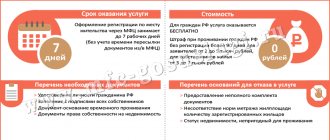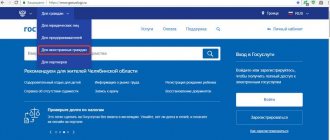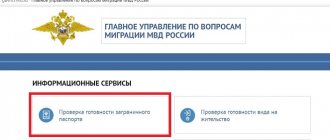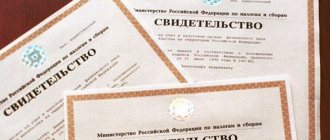Every manager, both large and small, from time to time has to “receive guests” in the form of inspection bodies.
And if you have foreign citizens on your staff, then you cannot avoid an inspection of the enterprise by employees of the Main Directorate for Migration Affairs of the Ministry of Internal Affairs. What are the inspections of the Federal Migration Service (GUVM Ministry of Internal Affairs), how to behave with inspection organizations, what actions should you take as an employer if your company has not passed the inspection of the Federal Migration Service (GUVM Ministry of Internal Affairs) and you received a large fine, the answers to these and many other questions you you will find in our article.
Grounds for conducting an on-site inspection
The inspection plan is authorized by the head of the migration unit for the territory of the migration service area. Typically, as a rule, a scheduled inspection is carried out after three years from the date of:
- State registration of a legal entity;
- Completion of the last scheduled inspection of the Main Department of Migration Affairs of the Ministry of Internal Affairs;
- Start of business activities in accordance with the submitted notice of commencement of business activities.
On-site unscheduled inspections are carried out according to the same algorithm as scheduled ones, with minor differences.
But it is important to know that employers have the right to conduct unscheduled inspections if the migration authorities have specific information about violations of the current migration legislation of the Russian Federation regarding the registration, management and employment of foreign labor. The decision to inspect the employer of the Main Directorate for Migration of the Ministry of Internal Affairs (FMS) is made directly by the head of the Main Directorate for Migration Affairs of the Ministry of Internal Affairs or his deputy. According to the rules of the law, the period for checking an organization of the Ministry of Internal Affairs is 7 days, but can be extended for another 7 days, depending on the situations, both in the internal work of the organization and the inspection body.
How are the FMS and the Main Directorate for Migration Affairs of the Ministry of Internal Affairs informed about the inspection?
In accordance with clause 15 of the Regulations, the period of on-site inspection for compliance with migration legislation cannot exceed seven days. However, it can be extended for a similar period (up to seven days).
The inspection plan is authorized by the head of the migration unit for the territory of the migration service area.
The inspection is considered to have begun from the date of issuance of the order to conduct it, unless otherwise specified in the order, and completed before the deadline established in the order to conduct it.
It is recommended to undergo verification every time if you suspect that you may not be allowed into the country. The database is updated once a month.
Sending (delivering) a copy of the order to conduct an inspection to the person being inspected, a representative of the person being inspected, the owner or other holder of the inspected object of inspection is carried out on the day of departure to the inspected object.
Foreign citizens who are highly qualified specialists and members of their families are exempt from the obligation to perform actions necessary for their registration at the place of residence for a period not exceeding 90 days from the date of their entry into the territory of the Russian Federation.
Stages of conducting an on-site inspection of the Main Department of Migration Affairs of the Ministry of Internal Affairs
As a rule, an on-site inspection has 5 stages: At the first stage, the inspection authorities get acquainted with a representative of the inspected organization, provide documents, show certificates and a decision to conduct an inspection, signed directly by the head of the inspecting organization.
At the second stage of the inspection of the Main Department of Migration Affairs of the Ministry of Internal Affairs (FMS), the inspecting inspector requests the documentation of the organization or individual entrepreneur necessary for the inspection. The third stage of the inspection takes a fairly long period, during which the inspection organization processes all the documents provided to it regarding the migration registration of employees at the site. The fourth stage is to write an act upon the fact of conducting an inspection at this facility.
This action is carried out directly by the chief inspector, and he must put a stamp, signature, and exact date and time on all documents. The final stage of the audit - the head of the organization, together with the accountant and HR specialist, familiarize themselves with the result of the audit and draw up objections, if any.
If the manager does not agree with the results of the audit of the company by employees of the Main Department of Migration of the Ministry of Internal Affairs (FMS), then the sixth stage can be included in this list - preparation of documents for the arbitration court.
An inspection of an employing company is considered legal if, before conducting it, the controllers of the inspection services provide the following documents:
- The original document of the order to conduct the inspection together with its copy, which is handed to the head of the inspected legal entity or individual entrepreneur on the day of departure to the inspected facility with a receipt stamp;
- Service ID of a migration service employee.
In addition, even before the start of the inspection, representatives of the organization being inspected must be familiarized, against receipt, with the procedure for conducting the inspection, as well as with their rights and obligations. If the head of the company is not familiar with these rules, then the inspection inspector is obliged to voice all the nuances of the inspection.
Migration registration of foreign citizens in the Russian Federation in 2020
Upon arrival of a foreign citizen at the hotel, the hotel administration is obliged, within 1 working day following the day of his arrival, to notify the territorial body of the Ministry of Internal Affairs of the Russian Federation about the foreign citizen’s arrival at the place of stay.
The main regulatory legal act in the sphere of regulating the regulatory activities of state bodies is the Federal Law of December 26, 2008 N 294-FZ “On the protection of the rights of legal entities and individual entrepreneurs in the exercise of state control (supervision) and municipal control” (hereinafter referred to as Federal Law N 294- Federal Law).
Require the audited organization to submit copies of documents in duplicate. When providing the necessary copies of documents, they must be certified by the signature of a representative of the organization and sealed. A transfer and acceptance certificate is drawn up regarding the seizure of certified copies of documents.
If representatives of the Federal Migration Service do not find an accredited company at the address indicated in the registration file (by sending requests, letters to this address or conducting an on-site inspection), then it will be placed under so-called “control”.
What category of foreign citizens are exempt from registration at the place of residence and for how long?
An on-site inspection is carried out by sequentially requesting and studying documents, data and information at the inspected object (at the person being inspected), in other organizations, government bodies, as well as information available in the divisions of the Federal Migration Service of Russia, internal affairs bodies of the Russian Federation.
Checking the presence of a ban on entry into Russia using the official FMS database through the Rosdolgi online service. Fill out all the fields below and the service will automatically check against the current FMS database. The original order, signed by the person being inspected, a representative of the person being inspected, the owner or other owner of the inspected object, is attached to the inspection materials.
Restrictions on scheduled inspections
From January 1, 2021 to December 31, 2021, so-called “supervisory holidays” are introduced for small and medium-sized enterprises.
This bill involves establishing a ban on conducting scheduled control inspections (this does not apply to unscheduled inspections). However, not all entrepreneurs will be able to use it. There are a number of criteria that not all organizations fall under: The first criterion is the number of employees (for the previous year, the number of employees should not exceed 15 people for micro-organizations and 100 people inclusive for small businesses).
The second criterion is revenue. The revenue of an organization or individual entrepreneur from sales excluding VAT for the previous calendar year should not exceed 120 million rubles. for microorganizations and 800 million rubles for small enterprises.
Also, organizations from such areas as healthcare, education, heat supply, electricity and social spheres do not fall under “supervisory holidays”.
Documentary check by the migration service of the Main Migration Service of the Ministry of Internal Affairs
Typically, a documentary inspection of an inspection body is carried out on the basis and with the mandatory availability of all necessary documents, as well as information received directly from other inspection organizations, as well as from their personal “channels” and sources of information, without inspectors visiting the site being inspected.
The period of such an inspection of the employer by the Ministry of Internal Affairs cannot exceed 1 month, but it can be extended for another month by the official who ordered the inspection, if there is such a need.
Host party for registration of a foreign citizen
There are also on-site and documentary checks. A documentary check is carried out if a division of the Russian Federal Migration Service receives information about possible violations of the provisions of the migration legislation of the Russian Federation, as well as the presence in the available information of signs indicating an administrative offense.
Typically, a documentary inspection by the Federal Migration Service is carried out on the basis of documents received both from the organization being inspected and from other sources, without inspectors visiting the site being inspected. As a rule, the period of a documentary inspection cannot exceed one month, except in cases where its period is extended for another month by the official who appointed the inspection.
Based on the results of the joint inspection, an act is drawn up, which is signed by the head of the audit group and all employees included in the inspection team. If one of the employees does not agree with the act, he has the right to express a special opinion, which is reflected in this paper.
If an administrative offense is detected, an inspection report is drawn up. A protocol on an administrative offense may also be drawn up.
Grounds for conducting a documentary audit of a company
The grounds for ordering a documentary check of the organization of the Main Directorate for Migration Affairs of the Ministry of Internal Affairs are:
- obtaining information about possible violations of migration legislation;
- if there are already violations under any points of law.
Thus, the inspection is carried out on the basis of an order to conduct it. The order must contain the following information:
- name of the organization of state control (supervision);
- Full name, position of those authorized to conduct the inspection and full name of the experts involved in the inspection;
- organization of inspection. If the object of the inspection is a legal entity or individual entrepreneur, indicate the name of the organization, details and full name of the manager;
- goals, objectives, subject of the inspection and the period for its implementation;
- date and individual number (assigned by the main inspectors);
- the grounds for this inspection;
- list of documents necessary to achieve the goal;
- end date of the inspection of the migrants' employing company.
Verification methods
Based on its appearance, it is impossible to check the migration card, since there are no special recognition marks on the document other than the seal of the Ministry of Internal Affairs. But even this stamp cannot serve as a sign of the authenticity of the migration card.
You can only check the authenticity of a migration card using a unique number that is assigned to each document.
Location of the migration card number on the form
You can check authenticity in several ways:
- By making a telephone call to the migration service.
- By submitting an application to the migration service.
- Through the website of the Main Department of Migration Affairs of the Ministry of Internal Affairs.
The first way is to call the office of the Main Directorate for Migration and indicate the number and series of the identity card (the details of the document with which the person crossed the border and on the basis of which he filled out the card are indicated). After providing the data, you will have to wait a few minutes. The migration service operator will check the accuracy of the information provided and answer whether the document is real.
The second method is a personal visit to the office of the Main Directorate for Migration Affairs of the Ministry of Internal Affairs in order to submit an application to determine the authenticity of the document. The application must be submitted at the place of registration. After submitting your application, you will need to wait a little. The applicant will receive a response in writing on the organization’s official letterhead.
The third method is checking through the portal. It's easy to check this way. It doesn't take long. Most migrants practice this type of check because they are afraid of contacting the Main Directorate for Migration.
It is also worth remembering that if, on the basis of a migration card, a foreigner has already received a patent allowing him to carry out labor activities on the territory of the Russian Federation, this means that the card is valid.
How to behave when checking the GUVM of the Ministry of Internal Affairs (FMS): procedure for checking the GUVM of the Ministry of Internal Affairs
- Say hello politely and, if possible, turn on the recorder. It is better to do this openly so that the inspectors can see your actions. They are already accustomed to such actions and consider them completely acceptable, especially since the secret recording cannot be used later.
- Be sure to ask to see all documents, especially identification, then write down all their data.
- Ask to see the inspection order and make a copy for yourself.
- Compare the names of the inspectors and the names indicated in the resolution.
- Ask the inspection officer to present the checkbook.
- Check that the regulation is correct and ask for the manual number in case of any problems.
Results of the inspection by the Main Department of Migration Affairs of the Ministry of Internal Affairs (FMS)
If, during an inspection of an enterprise, the FMS reveals violations, a protocol is drawn up to bring the perpetrators to administrative responsibility.
But you need to know that the verdict made by employees of inspection services may not always be justified. If you do not agree with the decision of the inspection specialist, you can always appeal it. We will tell you how to do this below. There are many cases in judicial practice where the court sides with the person being inspected or the migrant.
Shortcomings and abuse of authority by migration service employees can only be proven in court, and in case of violation and recognition of an error on the part of the Main Internal Affairs Directorate of the Ministry of Internal Affairs, you may be subject to penalties and administrative liability.
FMS inspection results
If, during an inspection, FMS employees identify a violation of the norms of the Code of Administrative Offenses of the Russian Federation, they will draw up a protocol on bringing the perpetrators to administrative responsibility. We will talk about what penalties can be applied to the company and to migrant workers below. But the decision made by the migration control body is not always justified. If you believe that FMS employees have illegally brought you to administrative responsibility, then the relevant decision can be appealed. There are plenty of examples where the court sided with the company being inspected or the migrant worker.
For example, an entrepreneur was fined 350 thousand rubles for illegally employing a foreign citizen. But the Arbitration Court of the Volga-Vyatka District, by its resolution of January 19, 2015 in case No. A39-695/2014, declared the decision to bring to administrative liability illegal due to the fact that the entrepreneur was not notified of the upcoming consideration of his case.
Often, shortcomings made during an inspection by FMS employees serve as grounds for canceling the decision to impose administrative liability and help avoid a fine. For example, the company challenged a fine of 750 thousand rubles in court and won the case. The court indicated the following - from the materials of the case on an administrative offense it is not clear that ... the department carried out procedural actions aimed at clarifying all the circumstances of the administrative offense, recording them, legal qualifications and procedural registration, which require significant time costs (resolution of the Arbitration Court of Volga- Vyatka District dated August 25, 2014 in case No. A39-4187/2013).
How much will you have to pay after checking the Main Department of Migration of the Ministry of Internal Affairs (FMS)?
In very rare cases, inspection authorities do not find any gross errors during inspections. But what threatens employers and their organizations for gross violations of migration laws can be clearly seen in the table below:
| Violation | Fine | Suspension of the company's activities (+/or alternative to a fine) |
| The company employs foreigners without permission (patent), or the work performed does not correspond to the data specified in the patent | 250-800 thousand rubles | 14-90 days |
| There is no permission to attract foreign workers | 250-800 thousand rubles | 14-90 days |
| The company did not notify the FMS about the conclusion/termination of an employment contract or civil contract with a migrant or missed the due date | 400-800 thousand rubles | 14-90 days |
| The above violations committed in the Moscow or St. Petersburg regions | 400 thousand - 1 million rubles | 14-90 days |
| The company did not notify the migration authorities about the payment of wages to highly qualified employees, if such notification was required by law | 400 thousand - 1 million rubles | No |
It is worth noting that the fine is imposed for each employee. Therefore, if you have 25 migrants working for you and you grossly violated all the rules, then in the worst case scenario you will need to pay a fine of 25 million rubles, a million for each illegal immigrant.
What to do after an inspection by the Main Directorate for Migration of the Ministry of Internal Affairs (FMS)? Procedure for appealing an inspection
The inspected party has every right to appeal against decisions and actions of inspectors made or carried out based on the results of an inspection of the FMS company (GUVM Ministry of Internal Affairs), both pre-trial and in court. To make a pre-trial appeal, you must submit a complaint to a higher official of the Main Department of Internal Affairs of the Ministry of Internal Affairs. This document should indicate:
- address, name of the superior structure, as well as full name. and the position of the person to whom the complaint is sent;
- FULL NAME. and address of the entrepreneur’s organization;
- time and date of inspection;
- number and date of drawing up the act;
- references to violated laws;
- your justification for the complaint, etc.
The application may be accompanied by both documents or copies thereof, and documents that confirm the applicant’s arguments.
This appeal must be considered by the FMS within thirty days, which is counted from the moment of registration of the application. Please note that this period can be extended, but not more than 30 days. However, most often, if controversial situations arise, they are resolved in court, and the main thing here is not to miss deadlines.
Thus, applications to recognize non-normative legal acts as invalid, decisions and actions (inactions) as illegal can be submitted to the arbitration court within three months from the day the organization became aware of the violation of their rights and legitimate interests (clause 4 of Article 198 of the Arbitration Procedure Code of the Russian Federation) .
But to appeal a decision in a case of an administrative offense, only 10 days are given from the date of receipt of its copy (clause 2 of Article 208 of the Arbitration Procedure Code of the Russian Federation). If these deadlines are missed for a valid reason, you can file a petition for their restoration.
How to protect an employer from inspections by the Central Internal Affairs Directorate of the Ministry of Internal Affairs?
Despite all the problems with migration accounting when using migrant labor, the benefits of working with foreigners are obvious for both large and small enterprises.
Therefore, Russian companies are striving to recruit foreign workers in low-skilled specialties and at the same time are looking for ways to solve problems associated with the legalization of migrants, their official registration, as well as personnel and tax accounting associated with them. The most relevant and new solution to this problem is to resort to outstaffing, since the removal of an employee from the company’s staff removes from the employer all the risks and problems associated with the registration and management of a foreign employee. That is, if you transfer migrants from the staff of your organization, their official employer becomes an outstaffing company, which means:
- You are not the employer's responsibility for them, since the employees are employed by another company.
- You are not listed in the register of the Main Directorate for Migration Affairs of the Ministry of Internal Affairs as a company that employs migrants.
- You are not afraid of any migration checks.
- You save significantly on taxes.
- You do not need to employ an additional accountant, HR specialist and courier.
You can find out in more detail about how to protect your organization by transferring foreign workers to the staff of your company, as well as to relieve yourself of all the risks and threats associated with the use of foreign labor, from our specialists, since the goal is to protect employers from illegal use of migrant labor and simplify their tax and personnel records.










